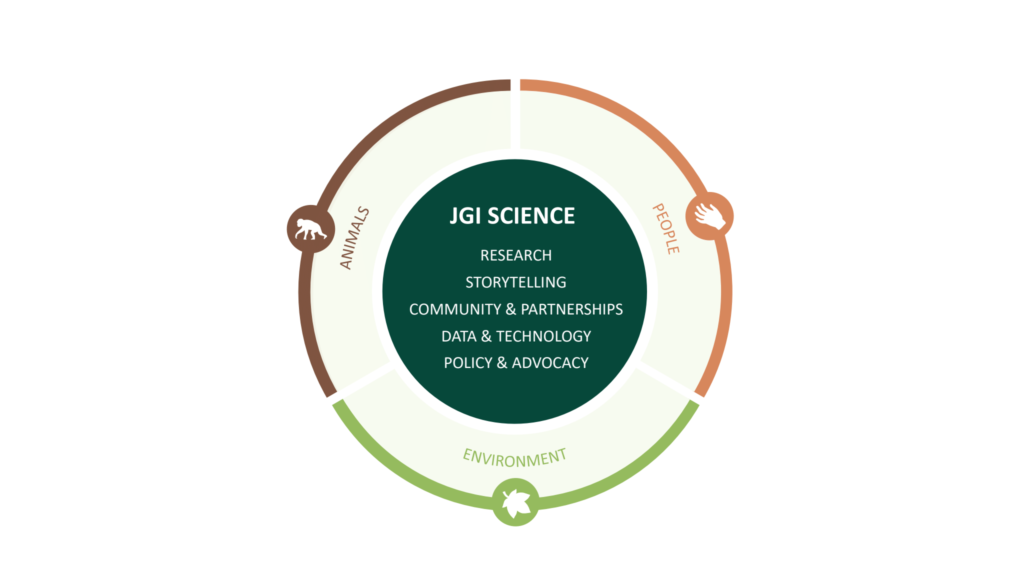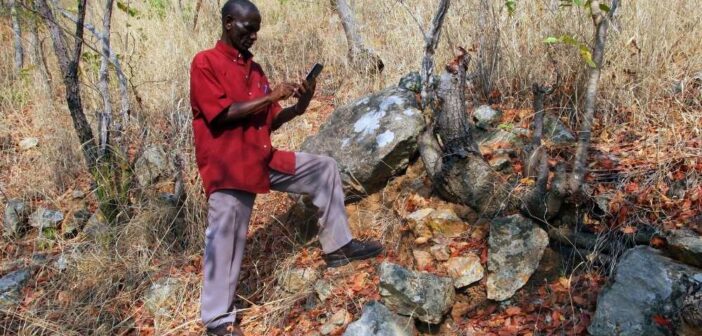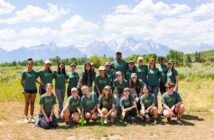Over 60 years ago, Jane Goodall advanced science through a unique combination of curiosity, focus on individuals as well as interconnections, observation, and collaboration.
This style of holistic thinking and systems through science — a result of Jane’s compassionate and forward-thinking nature — has defined the Jane Goodall Institute’s programs from the very beginning. In 2020, the work to further define, structure, and scale science throughout the entire organization came to fruition. This is being achieved through ongoing efforts to introduce a JGI Science Strategy, which is developing a common vision and tools to support all JGI programs on every level. With this strategy, we will unlock the power of data, innovative technologies and partnerships like never before.
JGI Science advances Jane’s legacy by tackling complex questions with intention through our fundamental lens. This perspective highlights the essential interconnection between other animals, people, and the environment. By focusing on long-term basic and applied research shaping impactful actions and results, our organization is one that integrates different disciplines, sectors, and ways of knowing. Our transformative systems-driven approach, realized through this strategy, helps us achieve science-based outcomes that we can put in the hands of local stakeholders and decision-makers, while also influencing the larger conservation landscape and dialogues for the better.
The JGI Science Strategy builds on and supports continuous development of our robust long-term data of individual behavior and socio-ecological research. This includes 65,000+ hours of data collected through observations of more than 320 chimpanzees over 60 + years. It also aims to develop an integrated JGI Science Platform and coordinated approach to collect, manage, share, and apply JGI’s data as valuable organizational assets. The JGI Science Platform builds on and expands concepts like JGI’s Decision Support System (DSS) to monitor chimpanzee habitat health, which integrates more than 30,000 Landsat satellite images. This generates actionable information to document chimpanzee habitat viability indicators using Esri’s ArcGIS platform. With over 6.2 million hectares of terrestrial and aquatic ecosystems currently under conservation management, we integrate local and expert knowledge, satellite Earth observation data and species modelling to monitor threats, identify the most effective conservation strategies, and measure success. Through 30 years of community-led conservation through Tacare, including over 500,000 community members as our partners in science and conservation in our program countries across Africa, this work always puts people at the heart.

The work of the JGI Science strategy focuses on several cross-cutting programmatic areas including: Research, Storytelling, Community & Partnerships, Data & Technology, as well as Policy & Advocacy.
By 2024, the strategy aims to:
- Advance our understanding and monitoring of chimpanzees, habitats, threats, and conservation success using long-term research, effective technologies, and citizen science
- Implement a systems-based approach in pursuit of targeted, cutting-edge, research topics to accelerate conservation outcomes and maintain JGI’s global leadership on priority issues
- Infuse science across JGI programs as a driving force behind our outreach and partnerships
- Inspire communities with science to catalyze action through compassionate and informed decision-making.
The Jane Goodall Institute’s Science Strategy is made possible by the generosity of Jim and Nancy Demetriades.






